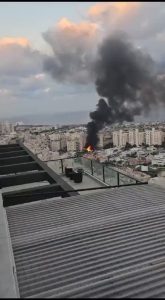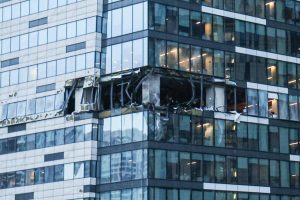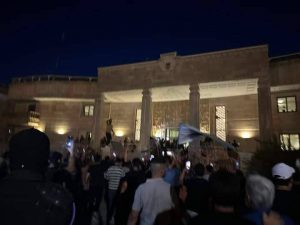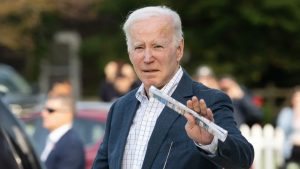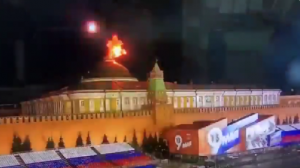An attack Wednesday on an airport in Arbil, capital of Iraqi Kurdistan, was carried out by a drone, the Kurdish interior ministry said, in an unprecedented escalation of the arms used to target US soldiers based there.
“A drone charged with TNT targeted a coalition base at Arbil’s airport,” the ministry said, adding that no one was hurt in the blast but a building was damaged.
Also Read | ‘Ugly’ remarks from Italian PM on Erdogan strongly condemned by Turkey
A Turkish soldier was killed by rocket fire at around the same time at a military base 50 kilometres (30 miles) east in Bashiqa, Ankara said, but there was no immediate confirmation of any link between the two attacks.
“We strongly condemn tonight’s terror attacks in Erbil and Bashiqa,” the Kurdish region’s premier Masrour Barzani said in a tweet after speaking with Turkish Foreign Minister Mevlut Cavusoglu.
“We agreed to stay in close contact as the investigation continues.”
Also Read | French IS widow in Syria camp, veil-free, wants to ‘go home’
There was no immediate claim of responsibility for the airport drone attack, which caused an explosion heard across Arbil.
But a shadowy pro-Iranian group calling itself Awliyaa al-Dam (Guardians of Blood), which claimed responsibility for a similar attack at the airport in February, hailed the blast in pro-Tehran channels on the messaging app Telegram.
A security cordon blocked all access to the airport, witnesses reported. The governor said air links were not interrupted.
“Outraged by reports of attacks in the Iraqi Kurdistan Region,” US State Department spokesman Ned Price said on Twitter.
“The Iraqi people have suffered for far too long from this kind of violence and violation of their sovereignty.”
Also Read | ‘Worse than a jungle’: A look at the cartel controlling Iraq borders
Some 20 bomb or rocket attacks have targeted bases housing American soldiers or diplomats in Iraq since US President Joe Biden took office at the end of January.
Dozens more took place over the preceding 18 months, with Washington consistently blaming pro-Iran factions.
Washington and Tehran are both allies of Baghdad, but remain sharply at odds over Iran’s nuclear programme.
On February 15, more than a dozen rockets targeted a military complex inside Arbil airport, killing an Iraqi civilian and a foreign contractor working with US-led troops.
Also Read | World urged to donate to Syria after decade of war
The complex hosts foreign troops deployed as part of a US-led coalition helping Iraq fight the so-called Islamic State group, a conflict that Baghdad declared as won in late 2017.
“It seems the same militia who targeted the airport two months ago are at it again,” Iraq’s former foreign minister Hoshyar Zebari, a prominent Kurdish political figure, posted on Twitter in an allusion to pro-Iranian factions.
“This is a clear & dangerous escalation.”
Pro-Iran groups have been ratcheting up their rhetoric, vowing to ramp up attacks to force out the “occupying” US forces, over a year after the Iraqi parliament voted to expel the American troops.
Counter-terrorism officials said only one rocket hit the airport on this occasion.
But an Iraqi security source told AFP that other rockets had crashed in the vicinity, including one targeting the Turkish troops.
Turkey has had troops in the area for more than two decades as part of its bid to crush the Kurdistan Workers’ Party (PKK) rebels, who have been waging an insurgency against the Turkish state since 1984.
Earlier Wednesday, two bombs also exploded on roads where Iraqi logistics convoys were carrying equipment for the international coalition in the southern provinces of Dhi Qar and Diwaniyah, according to security sources.
The United States last week committed to move all remaining combat forces from Iraq, although the two countries did not set a timeline for what would be the second withdrawal since the 2003 invasion.
The announcement came as the Biden administration resumed a “strategic dialogue” with the government of Prime Minister Mustafa al-Kadhemi, who is seen as too close to Washington by Iraq’s powerful pro-Iranian factions.
The region of Kurdistan has been autonomous since 1991 and has a population of five million.

